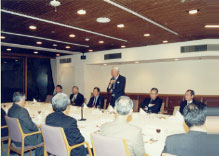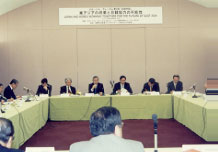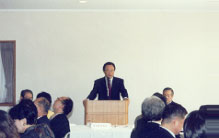International Dialogue
Summary of Dialogues
The Second Japan-Korea Dialogue Convened "Japan and Korea: Working Together for The Future of Asia "
The Global Forum of Japan (GFJ) and the Seoul Forum for International Affairs (SFIA), with the support from the Japan Foundation Asia Center and the Japan-Korea Cultural Foundation, co-sponsored the second Japan-Korea Dialogue on the theme of "Japan and Korea: Building Foundations for a New Partnership" on November 14-15, 2002 in Tokyo. After the welcome dinner hosted by Chairman Okawara Yoshio of GFJ on the evening of the 14th, there was a full day of lively discussions in the morning, luncheon and afternoon sessions among the 68 participants from Japan and Korea. Chairman Okawara Yoshio addressing the welcome dinner |
Centering on Political-Security Issues
Session I, on the morning of the 15th, was chaired by Prof. Ito Kenichi, Governor and Executive Director of GFJ, with the Dialogue centering on political and security issues. The keynote speech was delivered by Dr. Lee Chung Min, Professor at Yonsei University, Korea. Dr. Lee stated "The threat of the Korean Peninsula shifted from the possibility of the outbreak of war to nuclear suspicion, and it has turned into issues of political diplomacy. Due to the character of the threat, complex military, political, and economic reactions are required. Viewing East Asia as a whole, the short-term focus would be the nuclear suspicion of North Korea, the middle-term the Peninsula’s unification and the Taiwan Strait problems, and the long-term Chinese military aggrandization"In response to the keynote speech, commentators put forward their opinions for and/or against the keynote speech. "The North Korea problem is coming to a crisis that is equal to the nuclear crisis from 1993 to 1994. It is the last chance for North Korea to cooperate with Japan, South Korea and the United States," said Mr. Jimbo Ken, Research Fellow, the Japan Institute of International Affairs. "North Korea is much weakened when compared to its position in 1993, and its capability for brinkmanship is also declining. The gap of philosophy between President George Bush and President Kim Dae-Jung is serious," said Dr. Hyun In-Taek, Professor at Korea University. "Even if South Korea opposes, it is possible that the United States will attack North Korea. Rather, we should see it as if the U.S. is already determined to do it," said Mr. Takesada Hideshi, Professor at National Institute for Defense Studies. "The U.S. is warning of a rising China. It is important that South Korea, Japan, and the United States cooperate together to strengthen their engagement policy," said Dr. Kim Dal-choong, Professor at Korea University.
 Governor and Executive Director Ito Kenichi chairing the Session I. |
 Dr. Sakong Il, Chairman & CEO, Institute for Global Economics, delivering his speech as the Lecture Luncheon |
Centering on Socio-Economic Issues
In the Session II in the afternoon, Dr. Kim Kyung-Won, President of the Seoul Forum for International Affairs, assumed the role of the chairperson with discussions focusing on economic and social issues.In the keynote speech, Dr. Yamazawa Ippei, President, Institute of Developing Economies, stated that "Simultaneous advancement of economic globalization and regionalization is not paradoxical. Although liberalization and deregulation on a global scale would be the best, as it is not easy, competitive liberalization is performed. Thus regionalism becomes a next best policy. Since Japan would be left out if it does nothing and show only support for the WTO, it began to seek a FTA. A FTA must produce a trade creation effect exceeding a mere trade conversion effect. ASEAN is so popular that it is asked to conclude a FTA by both Japan and China." In response to the keynote speech, the following comments were offered from the commentators. "In South Korea, although the government and the business circles are positive to a FTA, medium and small sized companies are against it,Esaid Mr. Ro Sung-Tae, Editorial Writer of Joong-ang Ilbo. "The EU was unified through political initiatives. The Japan-South Korea FTA should learn from the experience of the EU," said Mr. Yakushiji Katsuyuki, Editorial Writer of The Asahi Shimbun. "ASEAN+3 is supposed to be 3+ASEAN. The reason it does not become so, is that 3 are disorganized," said Prof. Kim Jin-Hyun, Senior Research Advisor at the Korea International Trade Association. "A Japan and South Korea FTA is the first priority. Then, it is important to think that a FTA with ASEAN comes the second, and a FTA with China the third," commented Shimada Toshio, Corporate Advisor, ITOCHU Corporation.
At the Lecture Luncheon, also held on the 15th, Dr. Sakong Il, Chairman & CEO, Institute for Global Economics, addressed that "Although the construction of a regional community in Northeast Asia is our long-term ultimate goal, it is advisable to start from the realization of a South Korea and Japan FTA, learning the door open to China for the time being. I would also like to propose the establishment of a Northeast Asian Development Bank and a Northeast Asia Cooperation Secretariat." The lecture left a deep impression on all participants. On the evening of the 15th, a closing dinner was held by Dr. Kim Kyung-won, President of the Seoul Forum for International Affairs, with Korean food. The dinner carried on until late in the evening in an amicable atmosphere with friendships being strengthened.
